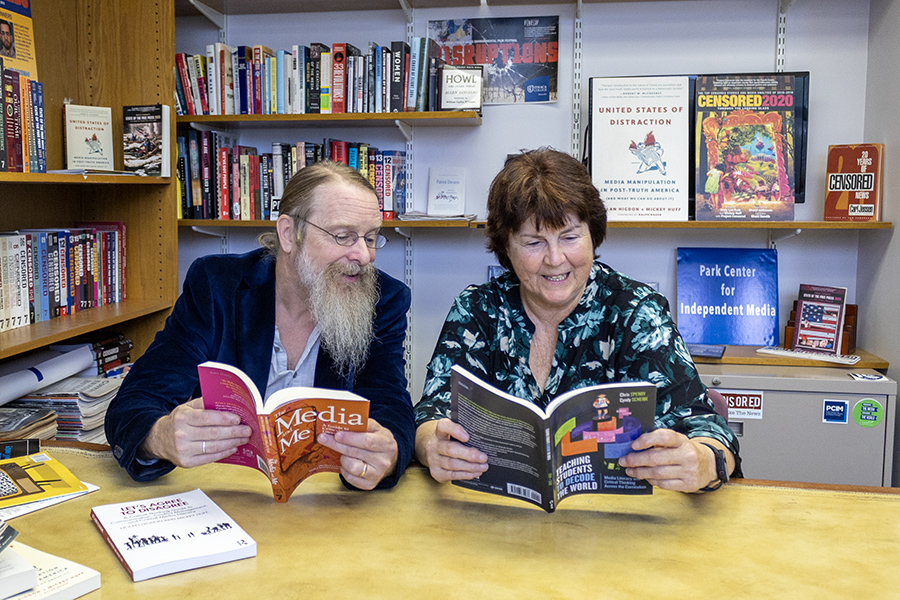At the beginning of Fall 2024, the Park Center for Independent Media at Ithaca College hired its third director. Mickey Huff, distinguished director of PCIM, is a well-known media critic and scholar in independent media and came to the college with plans to make media literacy more accessible across campus.
Since September, Huff has organized three events around the themes of critical media literacy: a panel discussion on censorship and intellectual freedom, a conversation outlining strategies to combat fake news ahead of the 2024 election and a book launch for “State of the Free Press 2025.”
Huff is also the director of Project Censored, a national organization focusing on critical media literacy, independent journalism and democracy. He is currently teaching a class about independent media and also plans to teach a course about fighting fake news in Spring 2025.
At his events, Huff invites known media scholars and makes it a point to collaborate with other departments on campus as well. Huff said this is an intentional effort to integrate media literacy more seamlessly into education.
“Higher education has a very terrible pattern in history of compartmentalizing everything,” Huff said. “But look, media literacy [and] independent media, these are very interdisciplinary areas.”
While Huff is new to the college, efforts to promote media literacy on campus have existed since 1996. Project Look Sharp is the college’s nonprofit media literacy program and aims to provide materials to teachers and students that promote critical thinking and a deeper understanding of media.
Cyndy Scheibe, professor in the Department of Psychology, is the cofounder and executive director of Project Look Sharp. With the influx of media around, Scheibe said she wants the school to have required media literacy courses and become more intentional with how they promote the concept.
“I think just having that common language is probably the most important thing,” Scheibe said. “Once [media literacy is] a college priority, then people think about that when they write courses, and when they create new courses, even if they’re temporary courses, or when they use language, when they’re promoting stuff. …That’s what I would love to see here, that it just becomes part of the language.”
Scheibe also coordinates the college’s 18-credit media literacy minor, which first started in 2019. The minor aims to educate students on understanding the credibility and questions one should be looking for and asking when analyzing media. According to Scheibe, there have been around 20 students that have graduated under this minor. Some of the other schools that offer similar minors include UCLA, Metro State University and the University of Iowa.
Scheibe said she has noticed Huff’s efforts and hopes that more people engage with PCIM’s programming.
“[Huff] just got here in September … and he’s already held these [three] major events, which were terrific,” Scheibe said. “I would have liked to have seen more people at both of them.”
Huff is hoping to work with Project Look Sharp to give students more access to media literacy education through foundations built already with the college.
“I came here because I didn’t have to reinvent a wheel,” Huff said. “I can work with [Project Look Sharp], I can plug in with them. And the work I do with media literacy … very well compliments the kind of work that they do.”
Junior Camie Purdy said via email that she believes media literacy is inherently a part of people’s lives. While new efforts to teach media literacy on campus are being made, Purdy said she hopes to see it included more seamlessly.
“I think instead of teaching this relatively nebulous idea of media literacy, we should just teach students to think critically about all information they consume, whether that’s things they see in media, read in books, hear from friends, family, even professors,” Purdy said. “When most people say that ‘media literacy is dead,’ what they really mean is that people have stopped practicing these sorts of critical thinking.”
Huff said in the future, he wants to create a critical media literacy course that is open to all majors at Ithaca College, not just students studying in the Park school or within the Department of Psychology.
“I want to figure out: how do I be part of that media literacy minor, but how do we blow that up and make it such that it’s not just a sub course in psych or it’s not just in journalism?” Huff said. “How do we get a general educational course on media literacy that speaks to the whole campus?”
Media literacy courses have increasingly become a part of graduation requirements at higher education institutions. While the college does not have a media literacy requirement yet, both Huff and Scheibe want to make media literacy an integral component of the college’s academic approach.
A national survey conducted in 2022 found that though 84% of adults surveyed thought that media literacy education should be required in more states, only 38% of respondents indicated that they had learned how to analyze media messaging in high school.
“I’d love to see that being something that people are thinking about: if Ithaca College is going to become well known in media literacy in the same way that the college has had as priorities [like] sustainability and diversity education,” Scheibe said.








